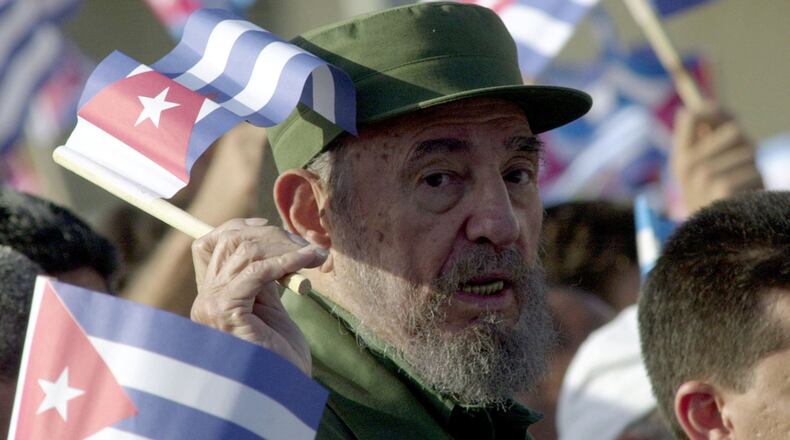For Cuban-Americans living in metro Atlanta, the death of Fidel Castro was a powerfully symbolic event, an emotional gateway from a painful past into a hopeful future, a promise of prosperity and democracy.
But each seems to have a different balance between forward-looking hope and backward-looking anger.
And many view Castro’s passing as a passage for Cuba itself.
“When you see thousands of people trying to leave, leaving in boats, it is because they want a different way,” said Joel Ferrer, 45, a chef in a Tucker restaurant who left Cuba nine years ago. “I believe in God so I am not happy when somebody dies, but in this case, I think it will be good for the Cuban people.
“When I was born, everybody was supporting Castro, but that changed. Things change when people have more information. So does the concept of revolution, that changes too.”
Unlike the older generations, some who left the island nation as children seem to show less intense resentment toward Castro while having a more positive outlook about Cuba.
For instance, Sue Horn, 58, of Lawrenceville, was born the daughter of a diplomat working for the Cuban dictator Fulgencio Batista.
“They lost everything they had and were very resentful,” she said. “But I don’t hold the same views because I didn’t lose anything.”
The revolution that Castro led – the seizure of property, a sometimes violent conflict with the United States, the jailing and executions of opponents and the one-party rule that has lasted through 11 U.S. presidents – left a tangled legacy that still divides Cubans.
Castro did wrong, but did not operate in a vacuum, Horn said.
“He was vindictive against the people he thought were his enemies, but he did have a lot of enemies,” she said. “And you could talk to my sister and they wouldn’t agree with me. This is something that touches a nerve.”
The father and grandfather of Lucas Perez-Leahy left Cuba in 1962. And while the 22-year-old Perez-Leahy was born and raised in Atlanta, he saw the exile experience color the outlook of everyone in his family.
“In my family, there are Republicans and Democrats but almost everybody is conservative in the way that they view Cuba-American relations,” he said. “When relations with the United States were normalized there was an emotional response.”
Castro took on a stature that intensified both ardor and contempt, Perez-Leahy said. “He was mythic. I can understand the anger and job that people in Miami are feeling about his death.”
Some may feel the kind of raucous joy that sent residents into a neighborhood-wide party in the streets of Little Havana in Miami. But among Cuban-Americans contacted by The Atlanta Journal-Constitution locally, it was more common to find a sort of weary relief.
“I don’t want to celebrate someone’s death, that’s not who I am,” said René Diaz, who left Cuba as a child in 1967 and is now chief executive of Diaz Foods, the company his family founded here. “I am celebrating the fact that people are finding some closure. And that there still is more to come.
“I am sad that my father and grandfather did not live to see this day because they lost everything.”
And while he had nothing positive to say about Castro, he wants to put him into context.
“I have a lot of friends who grew up without their parents,” Diaz said. “That is unforgiveable. But it is not just one man, not Fidel Castro only. It was the generals and colonels who stood by him, the soldiers that carried out the orders. Everyone has responsibility.”
The history of Cuba has a long arc. Before Castro was Batista, also a dictator, but one cozy with U.S. government and businesses. In 1957, two years before Castro came to power, Lisa Flowers' mother left Cuba.
Though she was raised in the U.S., Flowers, now a professor at Emory University’s school of medicine, said she feels foreover enmeshed in the country and its culture. She has traveled to Cuba three times and still has relatives there.
Castro’s death raises questions, she said, “about the future of Cuba, the future of the people in Cuba, what changes might happen and wanting the changes to be positive. This is my mother’s country.”
Jorge Fernandez of Atlanta left Cuba with his sister in 1961. His parents couldn’t get out for another year. He was 10.
The death of Fidel Castro will lift a symbolic weight, making it easier for the government to continue a difficult trek that can someday bring democracy, he said. “This is the first time that the linkage of Fidel may have been may have been a kind of anchor against changes. Now, that is no more.”
There are questions, of course, about how the incoming American president will handle relations, he acknowledged: Will the governments be friendly? Will diplomacy and trade and cultural exchange continue?
“But at the end of the day, whatever the new administration does, the real changes have to come from Cuba,” Fernandez said. “This is a watershed moment.”
Staff writer Shelia Poole contributed to this article.
About the Author
Keep Reading
The Latest
Featured


